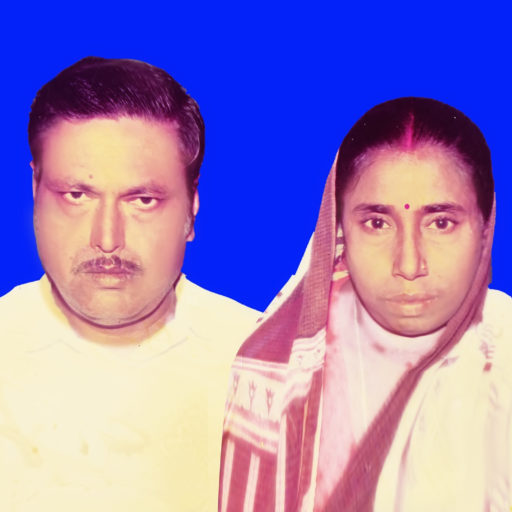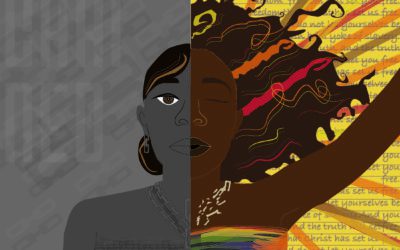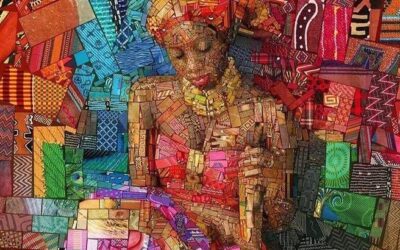17 African American Women Theologians You Should Know About
By Emmanuella Carter
Series Editor for the Mosaic Bulletin: Juliany González Nieves
Series Editor: Graham Joseph Hill
I have studied at Christian schools my entire life. After graduating from high school, I went on to pursue a B.A. in Theology at a well-known evangelical institution. In all those years, I never had an African American woman as a professor of Bible or theology. Moreover, I did not even have a required textbook written by an African American female author. Now, as a third-year M.Div. student, things haven’t changed.
My experience is not unique. However, I am frustrated by the effects. Consider the issue of representation. It does not seem like a big deal until one day you realize that without representation, you are invisible. It does not happen all at once. It is a long process. It is a “Shhh” that is ever-increasing until, eventually, you are unable to hear yourself in the narrative. Your perspective, your experience, your voice will not be heard. There is just silence. And with that silence comes the invisibility, the erasure.
However, the erasure does not happen because African American women are not speaking or because they are not present. There are voices. Black women have been theologizing for a long time. But for a significant extent of our history, African American women had no official office in theology departments. Although they were not acknowledged as theologians, you can hear their theology in the poetry of Phyllis Wheatley, the activism of Sojourner Truth, and the preaching of Jarena Lee. These women and many others refused to be quiet. Wherever there were ideologies that declared their invisibility, these women preached, marched, wrote, and spoke their way into existence.
Today, black women theologians are still speaking and teaching us about God. For this reason, we have decided to feature 16 African American women theologians and biblical scholars you should know.
Andrea C. White
Rev. Dr. Andrea C. White serves as Associate Professor of Theology and Culture at Union Theological Seminary in New York. She specializes in constructive Christian theology, particularly womanist theology, and postmodern religious thought. Dr. White also serves as the Executive Director of the Society for the Study of Black Religion, and as the co-chair of the Black Theology Group of the American Academy of Religion.
She earned a Bachelor of Arts with honors in Philosophy from Oberlin College, a Master of Divinity with a concentration in philosophy of religion from Yale University Divinity School, and a Ph.D. in Theology from the University of Chicago Divinity School.
In 2018, she presented a keynote address titled “Political Apostasy, Black Nihilism, and Barth” at the Karl Barth Annual Conference in Princeton Theological Seminary. This year, she delivered a sermon titled “A Vocation of Agony” for the King and Faith Lecture Series for the Northern California Dr. Martin Luther King, Jr. Community Foundation in San Francisco.
Her forthcoming publications include The Back of God: A Theology of Otherness in Karl Barth and Paul Ricoeur, The Scandal of Flesh: Black Women’s Bodies and God Politics, and Feminist and Womanist Theologies.[1]
Joanne Marie Terrell
Dr. Joanne Terrell is a native of Springfield, Massachusets. She holds a dual B.A. in Philosophy and Religion and Behavioral Science from Rollins College in Winter Park, Florida; and an M.Div., M.Phil., and Ph.D. from Union Theological Seminary in New York. Currently, she serves as Associate Professor of Theology, Ethics & the Arts at Chicago Theological Seminary, where she specializes in black theology.
In 2018, she presented the Grawemeyer Religion Award lecture on behalf of Dr. James H. Cone, who could not make it to Louisville to discuss his book, The Cross and the Lynching Tree. Dr. Terrell is a former doctoral student of Dr. Cone.
An ordained elder in the African Methodist Episcopal Zion Church, she is the author of Power in the Blood?: The Cross in the African American Experience (Wipf and Stock, 2005).[2]
Diana L. Hayes
Dr. Diana L. Hayes is a womanist theologian in the Roman Catholic tradition. She is Emeritus Professor of Systematic Theology in the Department of Theology at Georgetown. Her areas of expertise are Black Theology, U.S. Liberation Theologies, Contextual Theologies, Religion and Public Life, and African American and Womanist Spirituality.
Dr. Hayes holds several doctoral degrees, including a Juris Doctor from the George Washington University, a Ph.D. in Religious Studies and a doctorate in Sacred Theology from the Catholic University of Louvain, Belgium. She is the first African American woman to receive the Pontifical Doctorate of Sacred Theology Degree from this institution.
In 2004, she received the Elizabeth Seton Medal for Outstanding Woman Theologian from Mt. St. Joseph College in Cincinnati. She also received the U.S. Catholic Award for Furthering the Role of Women in the Church.
She is well-published, having written seven books and over 85 articles. Her publications include And Still We Rise: An Introduction to Black Liberation Theology (Paulist Press, 1996), Taking Down Our Harps: Black Catholics in the United States (1998), and Standing in the Shoes My Mother Made: A Womanist Theology (Fortress Press, 2010).[3]
Eboni Marshall Turman
Rev. Dr. Eboni Marshall Turman is the former director of Black Church Studies at Duke Divinity School. Now, she serves as Assistant Professor of Theology and African American Religion at Yale University Divinity School. Dr. Turman holds an M.Div., M.Phil., and Ph.D. in Christian Social Ethics from Union Theological Seminary. Additionally, Turman is the youngest woman to be named Assistant Minister of the historic Abyssinian Baptist Church in New York City (2002-2012), and the second woman to preside over the ordinances in its 210-year history.[4]
Her writings include Toward a Womanist Ethic of Incarnation: Black Bodies, The Black Church and the Council of Chalcedon (Palgrave, 2013), and her forthcoming monograph Black Women’s Burden: Sexism, Violence, and the Black Church.
Jacquelyn Winston
Rev. Dr. Jacquelyn E. Winston is a patristics scholar, with an emphasis on the history of the first five centuries of the Christian Church. Her areas of interest include the uses of religious rhetoric to marginalize “the other,” cultural and religious constructions of identity, martyrdom and a theology of suffering, Jewish Christian relations, and material cultural analysis.
As an ordained minister with the Foursquare denomination, her approach to the academic setting is to make theology relevant and living. She states, “Theology is not a dry set of theories devoid of their social and cultural context. It is the living Body of Christ attempting to come to grips with the way that Jesus reveals Himself in our current settings.” In 2007, Dr. Winston became Associate Professor in Church History at Azusa Pacific University, and in 2010, she became the director of the Theology Program.
She earned both her M.A. in Pastoral Studies with an emphasis in Urban Ministries and her M.Div. from Azusa Pacific and received her Ph.D. in History of Christianity from Claremont Graduate University.[5]
Her publications include The Assassin of a Prophetic Imagination: Imperialistic Rhetoric in Ancient Rome and Contemporary America (2012), and Listening to the African Witness (2013).
Stephanie Crumpton
In 2017, Rev. Dr. Stephanie M. Crumpton joined the faculty at McCormick Theological Seminary as Assistant Professor of Practical Theology. Currently, she serves there as Associate Professor of Practical Theology. Dr. Crumpton holds a Doctor of Theology, Pastoral Care & Counseling from Columbia Theological Seminary in Decatur, GA; an M.Div. from Johnson C. Smith Presbyterian Seminary at the Interdenominational Theological Center, Atlanta; and a Bachelor of Arts in Broadcast Journalism from Oklahoma’s Langston University.
She is an ordained minister in the United Church of Christ. Dr. Crumpton specializes in pastoral theological methodology, theories of personality development, historical and social dimensions of pastoral counseling, pastoral counseling as a specialized form of the church’s ministries, and family systems theory.[6]
Her major publications include A Womanist Pastoral Theology Against Intimate and Cultural Violence (Palgrave Macmillan, 2014) and After the 911 Call: A Pastoral Theologian Reflects on Family Violence Advocacy (2013).
Katie Geneva Cannon
On August 9, 2018, the Rev. Dr. Katie Geneva Cannon went home to be with the Lord. Dr. Cannon was born in Kannapolis, North Carolina. At a very young age, she became a member of the United Presbyterian Church. On April 24, 1974, she became the first African American woman to be ordained by the denomination.
Cannon earned a Master of Divinity from Johnson C. Smith Theological Seminary. In 1983, she became the first African American woman to receive the Doctor of Philosophy degree from Union Theological Seminary in New York.
Dr. Cannon became the Professor of Christian Ethics at Union Presbyterian Seminary in 2001. Her outstanding work merited her many awards, including the 2018 Excellence in Theological Education Award.[7]
Her co-edited publications include Inheriting Our Mothers’ Gardens: Feminist Theology in Third World Perspective (Westminster John Knox Press, 1988), Womanist Theological Ethics: A Reader (Westminster John Knox Press, 2011), and The Oxford Handbook of African American Theology (Oxford University Press, 2014).
Keri L. Day
Dr. Keri L. Day is an Associate Professor of Constructive Theology and African American Religion at Princeton Theological Seminary. Her research interests include womanist/feminist theologies, social critical theory, cultural studies, economics, and Afro-Pentecostalism. She holds a Ph.D. in Religion from Vanderbilt University, an M.A. in Religion and Ethics from Yale University Divinity School, and a Bachelor of Science from Tennessee State University.[8]
Dr. Day has authored two books: Unfinished Business: Black Women, the Black Church, and the Struggle to Thrive in America (Orbis Books, 2012); and Religious Resistance to Neoliberalism: Womanist and Black Feminist Perspectives (Palgrave Macmillan, 2015).
Kelly Brown Douglas
In 2017, Rev. Dr. Kelly Brown Douglas was named Dean of Episcopal Divinity School at Union Theological Seminary. Within the same year, she became the Canon Theologian for the Washington National Cathedral in Washington DC.
Dr. Douglas was the first black woman to be ordained an Episcopal priest in the Southern Ohio Diocese and among the first ten to be ordained nationwide. She is one of the leading voices in the development of womanist theology, racial reconciliation, and sexuality and the black church. As a result, she is widely published in national and international journals and other publications. Her publications include The Black Christ (Orbis Books, 1994), Sexuality and the Black Church: A Womanist Perspective (Orbis Books, 1999), Stand Your Ground: Black Bodies and the Justice of God (Orbis Books, 2015), and What’s Faith Got to Do With It?: Black Bodies/Christian Souls (Orbis Books, 2005).
Dr. Douglas holds a Bachelor of Science summa cum laude in Psychology from Denison University, and an M.Div. and Ph.D. in Systematic Theology from Union Theological Seminary.[9]
Delores S. Williams
Delores S. Williams is the Paul Tillich Professor Emerita of Theology and Culture at Union Theological Seminary. She is considered the founding foremother of Womanist theology, and is best known for her 1993 book Sisters in the Wilderness: The Challenge of Womanist God-Talk.[10]
Emilie M. Townes
The Rev. Dr. Emilie M. Townes, a native of Durham, NC, is a womanist theologian, distinguished scholar, and leader in theological education. She is the Dean of Vanderbilt Divinity School and the E. Rhodes and Leona B. Carpenter Professor of Womanist Ethics and Society. Formerly, she was the Andrew W. Mellon Professor of African American Religion and Theology and Associate Dean of Academic Affairs at Yale Divinity School.
Townes is an ordained American Baptist minister, and she earned her master’s and bachelor’s degrees at the University of Chicago. She also holds two doctoral degrees: a D.Min. from the University of Chicago Divinity School, and a Ph.D. from the Joint Garrett-Evangelical Theological Seminary/ Northwestern University Program in Religious and Theological Studies. Furthermore, Dr. Townes is also the recipient of honorary doctorates from Washington and Jefferson College and Franklin College.
In 2015, she was awarded the Pacesetter Award from the American Association of Blacks in Higher Education. She has authored multiple publications, including Womanist Ethics and the Cultural Production of Evil (2006), Breaking the Fine Rain of Death: African American Health Care and A Womanist Ethic of Care (Wipf & Stock, 2006), In a Blaze of Glory: Womanist Spirituality as Social Witness (Abingdon Press, 1995) and Womanist Justice, Womanist Hope (1993). She co-edited Womanist Theological Ethics: A Reader (Westminster John Knox Press, 2011), and Faith, Health, and Healing in African American Life (Praeger, 2008).[11]
Jacquelyn Grant
Dr. Jacquelyn Grant is one of the three founders of Womanist Theology and Ethics, along with Katie Cannon and Delores Williams. Currently, she serves as the Fuller E. Callaway Distinguished Professor of Systematic Theology at the Interdenominational Theological Center in Atlanta, GA.
Originally, from Georgetown, SC, she was ordained in the African Methodist Episcopal Church in 1974. Additionally, she is the founder of The Black Women in Church and Society (BWCS) program, The Womanist Scholars Program (WSP) and Black Women in Ministerial Leadership Program (BWML).
Dr. Grant holds a B.A. from Bennett College and an M.Div. from Turner Theological Seminary at the Interdenominational Theological Center. She went on to receive an M.A. and a Ph.D. in Systematic Theology from Union Theological Seminary, becoming the first African American woman to earned the latter. Dr. Grant also holds several honorary doctorate degrees from Turner Theological Seminary, ITC; Payne Theological Seminary; Bennett College and Chicago Theological Seminary.[12]
Her publications include White Women’s Christ and Black Women’s Jesus: Feminist Christology and Womanist Response ( Scholars Press, 1989), Perspectives on Womanist Theology (ITC Press, 1995), and the book chapter “The challenge of the darker sister,” in Feminism and Theology (Oxford University Press, 2003).
Cheryl A. Kirk-Duggan
Rev. Dr. Cheryl A. Kirk-Duggan is currently Professor of Theology and Women’s Studies at Shaw University Divinity School in Raleigh, NC. She earned a Ph.D. in Religious Studies and was the recipient of the Excellence in Academic Research Award from Shaw University in 2009.
An ordained elder in the Methodist Episcopal Church, Dr. Kirk-Duggan is the author of over 20 books including Exorcizing Evil: A Womanist Perspective on the Spirituals (Orbis Books, 1994), Misbegotten Anguish: A Theology and Ethics of Violence (Chalice Press, 2001), and Violence and Theology (Abingdon Press, 2006).[13]
Monica Coleman
Dr. Monica Coleman is a theologian, scholar, activist, and Professor of Africana Studies at the University of Delaware. Formerly, she served as Professor of Constructive Theology and African American Religions at Claremont School of Theology, and as Assistant Professor of Systematic Theology at the Lutheran School of Theology at Chicago.
Dr. Coleman became an ordained elder in the Michigan Conference of the African Methodist Episcopal Church at age 19. She went on to receive her B.A. in African American Studies from Harvard University, and her M.Div. from Vanderbilt University School. She also holds an M.A. and Ph.D. in Religion and Theology from Claremont Graduate University.[14]
Dr. Coleman’s publications include Bipolar Faith: A Black Woman’s Journey with Depression and Faith (Fortress Press, 2016), Not Alone: Reflections on Faith and Depression (Inner Prizes Inc., 2012), and Making a Way Out of No Way: a Womanist Theology (Fortress Press, 2008). Additionally, she is the co-editor of Creating Women’s Theologies: A Movement Engaging Process Thought (Wipf & Stock, 2011) and the editor of Ain’t I a Womanist Too?: Third Wave Womanist Religious Thought (Fortress Press, 2013).
M. Shawn Copeland
Dr. M. Shawn Copeland is Professor Emeritus of Theology at Boston College, the institution from where she graduated with her Ph.D. in Systematic Theology. Before being appointed to that position, she served as Associate Professor of Systematic Theology at Marquette University. From 1994 to 2016, Copeland worked for The Institute for Black Catholic Studies at Xavier University of Louisiana.
In 2018, she was awarded the American John Courtney Murray Award, becoming the first African American woman theologian to receive such honor. She is also the first African American president of the Catholic Theological Society.[15]
Her publications include Knowing Christ Crucified: The Witness of African American Religious Experience (Orbis Books, 2018); Enfleshing Freedom: Body, Race, and Being (Fortress Press, 2009); and Uncommon Faithfulness: The Black Catholic Experience (Orbis Books, 2009).
Mitzi J. Smith
Dr. Mitzi J. Smith is the J. Davison Philips Professor of New Testament at Columbia Theological Seminary in Decatur, GA. Previous to this position, Dr. Smith served as the Professor of New Testament and Early Christian Studies at Ashland Theological Seminary in Detroit, MI. She holds a B.A. in Theology from Columbia Union College in Maryland; an M.A. in Black Studies from The Ohio State University; and an M.Div. from Howard University School of Divinity.
Additionally, Dr. Smith is the first African American woman to earn a Ph.D. in New Testament from Harvard. Her edited book I Found God in Me: A Womanist Biblical Hermeneutics Reader (Cascade Books) was chosen as one of Choice’s Outstanding Academic Titles in 2015.[16]
Her other publications include Womanist Sass and Talk Back: Social (In)Justice, Intersectionality, and Biblical Interpretation (Cascade Books, 2018); Insights from African American Interpretation (Fortress Press, 2017); and Teaching All Nations: Interrogating the Matthean Great Commission (Fortress Press, 2014), co-edited with Jayachitra Lalitha.
Traci C. West
Rev. Dr. Traci C. West is Professor of Christian Ethics and African American Studies at Drew University Theological School. She holds a B.A. from Yale University, an M.Div. from Pacific School of Religion, and a Ph.D. from Union Theological Seminary. West is an ordained elder in the New York Annual Conference of the United Methodist Church.[17]
Her publications include Solidarity and Defiant Spirituality: Africana Lessons on Religion, Racism, and Ending Gender Violence (New York University Press, 2019); and Disruptive Christian Ethics: When Racism and Women’s Lives Matter (Westminster John Knox Press, 2006).
The Challenge: The Church Must Listen to Itself
Can you imagine our Western theology without the German voice of Martin Luther or the Swiss voice of Ulrich Zwingli? What if we did not have the French voice of John Calvin, the Polish voice of Dietrich Bonhoeffer, or the Canadian voice of Don Carson? If we cannot imagine our theology without their voices, we must ask ourselves, “Why can we imagine our theology without the voices of Asian women, USA Latinas, Caribbean and Latin American women, Indigenous women, White women, Black women?” They, too, are a part of our Christian history. They also give shape to our theology. They, too, are the voice of the Church. The Church is speaking. Can you hear her? Will you listen to her?
Further Reading and Resources
This post is part of a series we are running profiling female theologians from all over the globe — see our other articles in this series:
Series Editor: Graham Joseph Hill
Stephanie A. Lowery, “9 African Women Theologians You Should Know About”
Juliany González Nieves, “23 Latin American Women and USA Latinas in Theology and Religion You Should Know About”
Emmanuella Carter, “17 African American Women Theologians you Should Know About”
Grace Al-Zoughbi Arteen and Graham Joseph Hill, “18 Arab Female Theologians and Christian Leaders You Should Know About”
Jessie Giyou Kim and Graham Joseph Hill, “18 Asian Female Theologians You Should Know About (Plus Others For You To Explore)”
Graham Joseph Hill and Jen Barker, “20 Australian and New Zealander Female Theologians You Should Get to Know in 2020”
Graham Joseph Hill and Jen Barker, “160+ Australian and New Zealander Women in Theology You Should Know About”
Graham Joseph Hill and Jessie Giyou Kim, “12 Women on Changing the World: A 12-Session Film Series on Transforming Society and Neighborhoods”
Juliany González Nieves, “Caribbean Christian Theology: A Bibliography”
Juliany González Nieves offers “A Reading List on Latinx and Latin American Theologies” HERE and downloadable HERE. See “A Latinx Theology Reading List” by Santi Rodriguez, HERE.
Mosaic Bulletin
This article will be published in the upcoming issue of the Mosaic Bulletin, a publication of Mosaic Ministries at Trinity Evangelical Divinity School. The Mosaic Bulletin aims to be a platform that amplifies the voices of seminary students, especially those at the margins, discussing everything from theology, race, and gender to bridging the gap between the seminary and the community, culture, and art.
 Emmanuella Carter holds a B.A. in Theology from Moody Bible Institute and is currently completing her M.Div. at Trinity Evangelical Divinity School. She serves in the leadership team of Mosaic Ministries, and as minister and women’s ministry leader at Progressive Baptist Church in Chicago.
Emmanuella Carter holds a B.A. in Theology from Moody Bible Institute and is currently completing her M.Div. at Trinity Evangelical Divinity School. She serves in the leadership team of Mosaic Ministries, and as minister and women’s ministry leader at Progressive Baptist Church in Chicago.
 Cover Image by Alexandria McCrory: Alexandria McCrory is a freelance graphic designer based in Lake County, IL. She earned her Bachelor of Social Science in Graphic Design from Trinity International University. She loves to fuse her passion for art and faith through the designs she creates. You can follow her on IG @agmalley95 and visit her website zamccror.myportfolio.com.
Cover Image by Alexandria McCrory: Alexandria McCrory is a freelance graphic designer based in Lake County, IL. She earned her Bachelor of Social Science in Graphic Design from Trinity International University. She loves to fuse her passion for art and faith through the designs she creates. You can follow her on IG @agmalley95 and visit her website zamccror.myportfolio.com.










Recent Comments